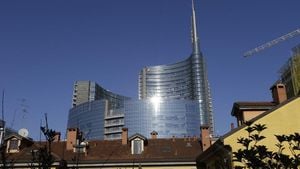The Scottish Government is gearing up for significant changes as it prepares to announce its budget for 2024, led by Finance Secretary Shona Robison. With pressure mounting on public services amid rising costs and emergency situations such as homelessness, the SNP is pulling out all the stops to secure support for its spending plans.
One of the most debated issues surrounding the upcoming budget is the potential reversal of housing cuts implemented by former First Minister Humza Yousaf, which saw £200 million slashed from the affordable housing budget. Feedback from various stakeholders, including housing groups, has been clear: the cuts must go. John Swinney, who steps back to front lines of financing after Yousaf's departure, seems poised to reinstate this funding. Leading the charge is Sally Thomas, chief executive of the Scottish Federation of Housing Associations, who has been vocal about the urgency of addressing the housing crisis.
"This budget needs to be a turning point," Thomas stated, emphasizing the dire need for affordable rented housing. She highlighted the importance of increased funding to combat spiraling waiting lists and reaffirmed the government’s commitment to eradicat child poverty by ensuring adequate housing solutions.
Yet, restoring the housing budget is just one piece of the puzzle. The Scottish Government will also need to demonstrate its commitment to the NHS, public services, and the environment—issues which have garnered complaints from various groups, including the Scottish Trades Union Congress (STUC). The STUC called on the Finance Secretary to deliver what they term as “a budget for communities.”
This includes proposals to scrap the council tax, raise wages for social care workers, improve public transport, and uphold commitments made to schoolchildren, such as free school meals. Their leader, Roz Foyer, framed the budget as not just another fiscal plan but as the potential linchpin for strong, well-resourced public services.
On the other hand, Scottish Labour has made it clear they will not support any budget they describe as subpar. Finance spokesperson Michael Marra has criticized the SNP, claiming, "Every single institution in Scotland has been left weaker by SNP mismanagement and waste," and posited the idea of triggering early elections if the budget fails to meet their standards. With the situation at the NHS increasingly desperate, Marra underscored the urgent need for change, asserting the SNP has yet to formulate effective plans to alleviate wait times and other systemic issues.
The stakes extend beyond immediate funding needs to encompass broader societal goals. Shona Robison's budget aims to tackle the climate emergency by creating jobs and opportunities within green energy sectors. She stated, "This will be a Budget which delivers progress for Scotland, by Scotland—laying the foundations for long-term success." Her agenda includes fostering sustainability, recognizing climate solutions as both local necessities and potential export opportunities, envisioning Scotland as a supplier of innovative, green solutions worldwide.
Despite facing opposition, Robison carries the advantage of anticipated additional funding from Westminster—an additional £1.5 billion for the next year and £1.9 billion for 2025-26—thanks to UK Chancellor Rachel Reeves. This improved fiscal position might lend the SNP some leeway to satisfy various factions vying for larger investments.
But with the minority government not holding the majority seats needed to push through its plans unilaterally, they require support—notably from the Scottish Greens, whose partnership was damaged following Yousaf’s controversial termination of their previous power-sharing agreement. Teaming back up may depend on the government's climate commitments, as the Greens have signaled their interests align with broader environmental initiatives.
Today promises to be pivotal. Robison is set to officially present the budget at 2:50 PM, where she’ll likely clarify the income tax rates alongside the potential for council tax increases. Observers are anxious to hear details on proposed funding allocations for various sectors, particularly the NHS and housing, addressing both immediate crises and long-term strategies.
How these spending intentions are navigated will likely dictate the Scottish Parliament's political dynamics for the foreseeable future. With local authorities grappling with precarious financial positions and public expectations high, the budget could symbolize much more than just funding allocations—it could either reinforce or challenge the SNP’s prevailing grip on Scottish governance.



